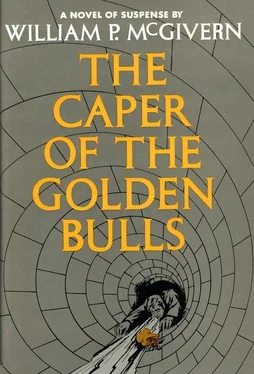“It’s cruel of you not to tell me what’s wrong.”
He turned his head. She sat on the edge of the bed, her back hollowed out as if she were on a show horse. She wore a white dress and her shoulders were bare. In the gloom she towered above him like a lovely iceberg floating serenely on dark polar seas.
“I’m desperate,” he said.
“I feel so helpless. Do you want to go to bed with me?”
“No darling.” This was a first, he realised with a touch of panic. He felt his head. “Have I gone bald, by any chance?”
“Of course not, you silly man. What ever gave you that idea? Anyway, if you comb it sideways, no one would notice such a little spot. Not for years.”
God, he thought. The bad things were happening at last. He saw himself locked in a prison cell, impotent, bald as an egg.
“Please tell me why you’re acting so strangely. I can’t bear to see you like this.”
Peter looked into her splendid loving eyes, luminous now with unshed tears, and came to a decision: He told her everything.
“What a horrid little bitch this Angela must be! Would she really throw your old friends to the wolves?”
“She most certainly would!”
“Peter, you aren’t pulling my leg, are you—”
“Damn it, of course not!”
“Seriously. You went about Europe breaking into banks, stealing all kinds of money?”
“In England too.”
“But why? And please don’t say because they were there. You must have had a good reason.”
“Of course. I wanted the money.”
“Peter, you’re teasing me. I’m really curious He managed to sip some coffee. Since he had gone this far, there seemed no point in not making a clean breast of things.
“All right. I’ve never told anyone before. And I’d appreciate it if you’d keep all this to yourself. It makes me appear an even greater fool than I actually am.” He sighed. “During the war I bombed a cathedral by mistake. It was at night so I didn’t kill anybody. But I felt terrible about it. I couldn’t get over it. Such staggering carelessness. It preyed on my mind. Imagine how you’d feel if you ran through a red light and killed Albert Schweitzer! Or dropped a Sevres bowl and smashed it to bits! Well, I felt even worse.”
“Oh, darling, I do love you. I can imagine how you must have felt. But aren’t you being too hard on yourself? It was wartime. You were flying a mission. You were over enemy territory.”
“No. I was returning from a mission. I was over Manchester, as a matter of fact.”
She sighed. “Well, I suppose that makes a difference.”
“It was eight hundred years old,” he said gloomily. “It had taken three generations of labourers and artisans to build it. I found all this out later, of course. They all had to go to confession before starting work in the morning. Each stone was put into place by men with theoretically spotless souls. Think of it! Then I fly by, mooning about steaks and beer and girls, and drop a bomb on it. The bomb-release mechanism is secured by throwing a switch to the right. To the right! That’s printed in block capitals in the manual. I yawned and threw it to the left. My silly name made it all the more ghastly.”
“I don’t understand.”
“Churchman. Peter Churchman. I’m not particularly religious or anything. But something is definitely wrong when a man named Churchman destroys a cathedral. It made me feel the butt end of a very stupid joke, I can tell you.”
“You poor dear. Only an exquisite sort of person would grieve about a thing like that.”
“Well, I decided to send them a contribution. It seemed the least I could do. I went into business, at which I was no good at all. Then I had an inspiration. I saved some money and tried my luck at Monte Carlo. I didn’t see how I could miss. I was doing the Lord’s work. God was my partner. But I lost every dime. And I never heard from God at all.”
She smiled and touched his cheek. “He was a silent partner, darling.”
Peter felt a stab of envy. How nicely that would have looked in his journal! The irrelevance of his thoughts depressed him, for he knew at heart he wasn’t a serious man; in the profound recesses of his being there sat a child grinning at comic books.
“I do understand now,” she said gently. “You robbed the banks to pay for the cathedral.”
“Yes. I deducted only my expenses. Of course, I had no way of determining the value of a cathedral. Costs have risen a lot since it was built, you know. But I settled on a million dollars. I collected that and sent it to the City Council of Manchester, with my apologies.”
“Oh, Peter. Did you tell them who you were or anything?”
“I couldn’t do that. I just said it was from a repentant airman, and hoped they realised it had been a mistake and so forth.”
The light in her eyes was like a bonfire whipped by high winds, splendid and exciting.
“Darling, how magnificent!”
He moved her dress and kissed her bare knees. Suddenly he felt much better; confession had eased his soul. He listened to the mounting tempo of his heart, and decided that things were quite all right again.
Things were unbelievably good once more, he realised, as his fingertips slowly rounded the delicious curves of her legs.
“Darling, lock the door.”
“Why?”
“I would love to merge with the infinite.”
“Oh, how sweetly you put things.”
She locked the door, undid straps and stepped from her dress and sandals. The light in the room was the colour of pearls now, the colour of southern seas at dawn, and through this shimmering translucence she came to Peter like a stately white clipper under gentle homing winds.
Mr. Shahari fled up an alley. Morgan cunningly plotted his probable course, waddled along side streets and caught him near the church square.
“Now look. About my father. I got that wrong. It was my uncle who died. But I’ll have the money next week. There’s no doubt of that. None at all.”
“I wish you happiness with it. But I am not going to Pamplona. This is my area. This is where I work.”
“Ah, come on. You’ll have fun.” Morgan winked and moved closer to Mr. Shahari. “Let me tell you about the girls who come down from Biarritz.”
Mr. Shahari backed away from the vast rounded prow of Morgan’s stomach. He sat down abruptly in the burros’ drinking fountain.
“Damn you, great fat fool! No, no, no.”
Morgan told Quince about it later. “He put on a good act, but he’s got the hook in his mouth. He’ll come to Pamplona, don’t worry. And there we shall kill him, eh Quince! With ritual and spectacle, eh Quince?”
Quince was silent. He believed he had already expressed himself more than adequately on this subject.
Peter worked with speed and precision in Pamplona. Time was his challenge and his enemy, but he deliberately made himself stand apart and examine the problem from a viewpoint that was nearly academic in its detachment and serenity. He analysed possibilities and calculated risks with surgical dispassion; this had always been his great strength, this ability to choose plans as if they were going to be executed by robots while he himself was off taking the sun on safe and distant beaches.
He would have liked weeks to study this job. Instead he had only days, only hours, to decide on a scheme that might save his old friends from Angela’s reprisals. No, he couldn’t be choosy; Peter was quite willing in fact to settle for anything that was not demonstrably suicidal.
He gave a list of things he might need to the desk clerk at his hotel.
“Yes, senior I’ll attend to it. Street maps. And films of San Fermin. Yes, I can have them sent over from the photographer’s shop.”
Читать дальше












